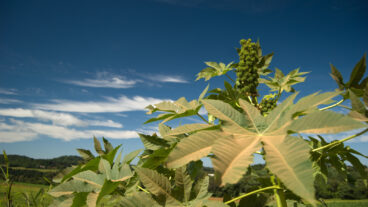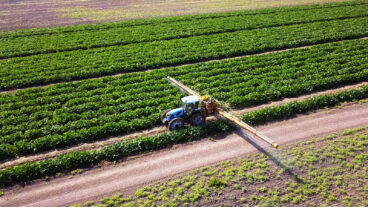The coated crystals are easily dissolved in water and sprayed on mature olives about ten days before harvesting.
A Ben-Gurion University team is in the final stages of developing a unique instrument for improving the efficiency of mechanical olive harvesting.
“Olive harvesting is a long, hard, highly expensive and destructive for the trees,” explains Dr. Ze’ev Wiesman, who is heading up the BGU team. “For traditional hand harvesting, an extremely high number of working hands is required. This amount of intensive labor is not readily available in the developed countries producing the majority of olives in the world.”
During the last three decades, several engineering solutions for mechanical olive harvesting have been developed. Most solutions have been based on tree trunk shakers and indeed significantly improved the situation.
However, after using trunk shakers, about 25% of the olive yield is still not harvested and remain on the tree. In addition, in many cases the length of the time required for trunk shaking is too long and the harvesting cost is not economically viable for the growers.
The total amount of olive-planted land is estimated at about 10 million hectares (about a billion olive trees) and the annual financial olive industry is valued at more than a billion and half dollars. Many trials to use hormonal and other agrochemical compounds to improve the efficacy of the olive mechanical harvesting have failed, due to lack of stability of the treatments, their very high cost and the severe damage they cause to the trees.
The new product developed by Dr. Wiesman’s team, with help from the Ministry of Industry, Trade and Labor, is based on nutrient crystals that are friendly to the tree and to the environment. A very low amount of hormonal component is integrated in the basic delivery components and they coat the nutrient crystals in a specially engineered technology.
The coated crystals are easily dissolved in water and sprayed on mature olives about ten days before harvesting. The bioactive materials of the product are slowly and continuously absorbed in the leave and fruit tissues.
As a result, the olive fruit retention force is significantly reduced and the trees respond easily to the shaker operation, causing nearly all the ripe olives to fall when the tree is shaken.
The revolutionary product has been successfully tested over the course of the last five years in Spain, Italy, Turkey and Australia, according to Wiesman.
These trials clearly proved that this product significantly improve olive mechanical harvesting in comparison to any other treatment and/or combination.
The product is in the final stages of formal registration in Spain and the EU carried out by Agro-Vant Ltd. (a start-up company established for commercialization of this development in cooperation with BGU).
“Right now,” Wiesman says, “this product is the only one tested and very close to approval for olive harvesting in Europe, which is responsible for producing about 85% of the world’s olive yield.”












